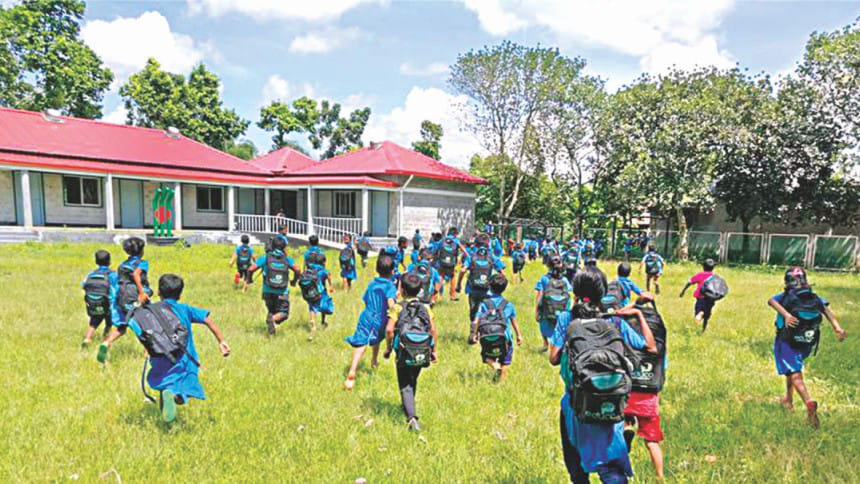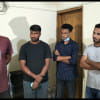BCL School Committee: Leave the kids alone

Just when we thought we've seen enough of Bangladesh Chhatra League, an organisation that has been the subject of one shocking headline after another over the last eight years, the student wing of the ruling Awami League has found a way to send us into collective shock again. The organisation has recently announced that it is moving ahead with a plan to form committees at high schools across the country, after having occupied every available space in the public colleges and universities, both general and specialised.
In a press note dated November 21, the BCL central committee said the objective behind the move is to "spread the ideology of Bangabandhu Sheikh Mujibur Rahman" among the schoolchildren and "give further impetus" to the organisation. Asked whether it would cause in schools the kind of violence witnessed in higher public institutions, BCL president Saifur Rahman Sohag waxed lyrical about how his organisation, contrary to popular belief, is changing the landscape of our education sector for good. "It is because of Chhatra League that universities have healthy student politics, and classes and exams are held properly," he said (The Daily Star, November 23, 2017).
His opinion, clearly, is not borne out by the facts on the ground or the views held by the general students. The truth is, the country's higher education is crumbling—in large part because of the brand of politics now in practice by an organisation whose legitimacy lies solely in its association with the ruling party and a legacy from the pre-independence period. BCL continues to be relevant not because of its pro-student activism, but because, like its rivals in the not-so-distant past, it wouldn't allow student politics to be "healthy" for anyone but its own leaders and members.
If this sounds like a platitude, it is because bad things keep happening around student politics. Every time it is in the news, you know something bad has happened. Someone has been beaten because he wouldn't follow an instruction; someone has died—a political rival, a general student, or a random guy who has had the misfortune of being in the crosshairs of a leader; a teacher assaulted because he or she took a position against the university administration; a classroom vandalised because an exam wouldn't be postponed. Or somewhere, in the back alley of some university, a question paper has been leaked—just to mention a few reported incidents.
That being said, apart from BCL, there are also many other players trying to grab a piece of the pie that is student politics.
According to an estimate, in the last eight years, incidents of violence and conflicts in different universities and colleges have caused at least 125 deaths, of which at least 60 were due to internal feuds in BCL (The Daily Star, November 23). If this violent and exploitative politics is now transported to the corridors of schools, what will happen to our secondary—and primary, by extension—education system is anybody's guess.
As for the fate of the children, the columnist Syed Abul Maksud, in a satirical piece published by Prothom Alo, offered his thought on how school politics might shape our future generation. The president, general secretary and other office-bearers of each school committee, he said, would be selected from the most "unbrilliant" of students. They will have their first lesson in "raising funds" even before the committee's inauguration ceremony, and in fist fights during a battle over who will preside over that ceremony. The battle will also spill over into classrooms. Teachers will be under threat.
Inspired by the BCL, continues Maksud, other political parties will also soon form their own school committees. Since each neighbourhood has several schools, there will be a war for territory control, not only among the rival groups but also within different factions of each committee. Political connection, for the children, will be viewed as a springboard for successful careers in the future. The whole school system will be in a mess.
This may be an exaggerated version of what the future holds for our schools if the students are exposed to violent politics at such an early age, but the possibilities are endless, and decidedly less inspiring.
The BCL logic behind the move also raises some moral questions: is it right to subject children to political indoctrination? Is it the responsibility of a student body to spread a particular ideology? How ethical is it to use children to extend one's party influence? The Awami League leadership has previously denied having any patience for organisations using children for political purposes, especially after news surfaced that a new organisation by the name "Shishu League" has emerged. Can they take the same moral stand now?
Clearly, BCL is too valuable for Awami League to disaffiliate from, whatever the crime, nor will it ban student politics in general despite its harmful effects on our education sector. In the political equation, student bodies are extensions of their mother parties, and help them solidify their control over the future generation of leaders. But given the sensitivity of this issue, Awami League will be expected to send a clear message that it will not stand for anything that embroils the children—in schools or colleges—in political activities.
Personally, I have nothing against student politics. In many countries today, there are student unions campaigning on behalf of students to impact policy decisions affecting their life and career. Bangladesh also has a rich history of student bodies waging important socio-political movements and serving the general students. But since the reinstatement of parliamentary democracy in the 1990s, with the political parties targeting students to advance their own interests, the reality has changed, and what we have now are the remnants of a system that has left its best days decades ago.
Whether Bangladesh will be able to revive the lost glory of its student politics and have unions that will truly represent the students and fight for their rights across the board is for the scholars to work out. Right now, the priority is to allow children to grow naturally, without undue interferences, and involve themselves in healthy life activities so they can serve their country better.
Badiuzzaman Bay is a member of the editorial team at The Daily Star.
Email: [email protected]










Comments